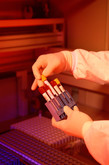Pharma News
Emerging markets: a clearer categorisation needed
Emerging markets are a popular topic at the moment, with pharma firms seeking sales growth outside the mature and slowing markets of the west.
Emerging markets key to Big Pharma growth
There is a growing consensus in the pharmaceutical industry that emerging markets will have to be a crucial component of the big players’ businesses if they are to maintain growth in the coming years.
US direct-to-consumer advertisements ‘led to higher drug prices’
A new study by Dr Michael Law et al. of the University of British Columbia in Vancouver, Canada, published in the Archives of Internal Medicine of 23 November 2009, suggests that US direct-to-consumer advertising (DTCA) for a top-selling drug had no effect on prescribing rates, but led to a major rise in the drug’s price. Use of Bristol-Myers Squibb/sanofi-aventis’ blood-thinner Plavix (clopidogrel), which first appeared on the market in 1998, did not increase as a result of the consumer advertising campaign for it, which began in 2001. However, a “sudden and sustained increase” in the drug’s price after the advertisements commenced cost 27 state Medicaid programmes an additional US$207 million in pharmacy expenditures during 2001–2005, say the authors.
Is the pharmaceutical industry ‘innovating to extinction’?
A new study in the Journal of the American Medical Association (JAMA) of 25 November 2009 examines an increasingly problematic phenomenon in the pharmaceutical industry: ‘innovation to extinction’. In short, the better pharmaceutical companies do their job, the more difficult it will be for companies to create innovative therapies, particularly for well-treated populations (and thus they increasingly focus on generics and biosimilars ...).
CMO market to be worth US$33.7 billion by 2014
The market for contract manufacturing organisations (CMOs) will be worth US$33.7 billion (Euros 22.4 billion) by 2014 according to the latest Business Monitor International (BMI) report The CMO Market Outlook: Emerging Markets, Key Players and Future Trends published in October 2009, which says developing biologicals/biosimilars capabilities is a key imperative for growth.
US lobbying, campaign contributions, and healthcare reform
As pointed out by Mr Robert Steinbrook in NEJM.org on 19 November 2009, interest groups are spending huge sums of money to influence the final US legislation and other matters pending in Washington. Since 2006, the health sector has spent US$1.7 billion lobbying Congress and federal agencies – more money than any other sector of the economy. Between January and September 2009, healthcare interests spent US$396.2 million. If current trends continue, the health sector is likely to spend more than half a billion dollars on lobbying in 2009. Pharmaceutical and healthcare products companies alone are likely to spend more than US$250 million, and the insurance industry, which is part of another sector, more than US$160 million. In all cases, these would be record annual expenditures.
Biopharma growing fast due to lower generics threat
Biopharmaceuticals, which are the fastest growing sector of the pharmaceutical market, are causing demand and manufacturing capacity issues, delegates heard at the Visiongain 3rd Annual Contract Manufacturing Conference meeting in London, UK, this week.
US drugmakers furious over price probe demands
US drugmakers have reacted with fury to two separate calls by Members of Congress for official inquiries into allegations of industry ‘price gouging’ in anticipation of healthcare reform.
Europe could beat US in biopharmaceutical innovation
Europe could overthrow the US as a leader in the biotech-drug industry if US lawmakers decide to shorten intellectual property protection for brand-name biologicals under proposed legislation, writes Ms Benedetto della Vedova, former member of the European Parliament, in The Wall Street Journal. A proposal to provide five to seven years of protection – shorter than Europe's 10 years – would stifle innovation and diminish the chance of US companies to be globally competitive, giving way for European firms to create the next generation of biotech treatments, Ms della Vedova writes.
Big Pharma seeks growth in emerging markets
China is the place to be for Western drugmakers seeking insurance against slowing growth, but plenty of other emerging markets are also tempting for Big Pharma, executives told the Reuters Health Summit.













